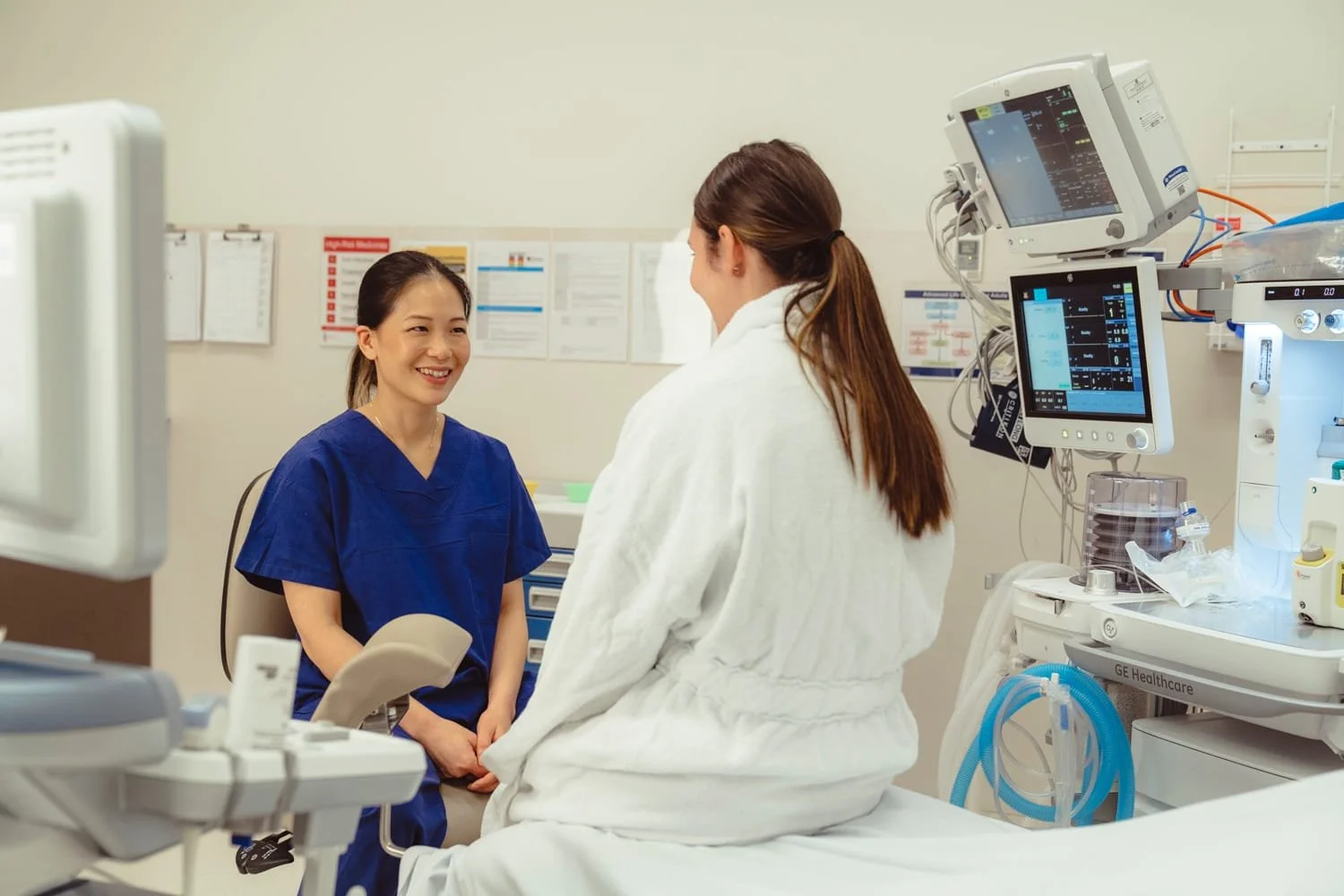Dr I-Ferne Tan: PCOS Specialist Sydney
PCOS has no cure, but it does have treatment and relief options. I'll work with your support team to build a customised treatment plan.
📞 Call us (02) 9161 4189
Understanding Polycystic Ovary Syndrome (PCOS)
Polycystic ovary syndrome (PCOS) is a complex hormonal imbalance that affects about 10% of women. It's a chronic condition that can't be cured but can be supported with lifestyle changes, medications, and fertility treatments.
Symptoms and Causes of PCOS
Common symptoms of PCOS include irregular menstrual cycles, excessive facial hair growth, scalp hair loss, acne, weight gain, and reduced fertility. The exact cause is not fully understood, but studies point to family history, genetics, lifestyle, and environment.
PCOS Diagnosis and Testing
Early diagnosis and support from a team of health practitioners can be pivotal for PCOS patients.
A diagnosis of PCOS should be considered if you have:
Irregular or absent periods
Acne, excess facial or body hair, scalp hair loss, or high levels of androgens in the blood
Polycystic ovaries visible on an ultrasound
Your specialist may conduct a pelvic exam or order blood tests and an ultrasound as part of the diagnostic process.
Treatment Options for PCOS in Sydney
The treatment options for PCOS span lifestyle changes, medications, and fertility treatments. Your healthcare provider might recommend medication, surgery, or fertility treatment, depending on your symptoms and goals for treatment.
📞 Call us (02) 9161 4189
Fertility Treatment Options for PCOS in Sydney
Fertility treatment options for PCOS may include medications to induce ovulation, in vitro fertilisation (IVF), and intrauterine insemination (IUI).
Medications may be used to induce ovulation.
IVF and IUI may be used to improve fertility in women with PCOS.
Finding the Right Specialist - Why Me
I'm a fertility specialist and reproductive surgeon passionate about women's health. In my practice, I blend innovation with compassionate, patient-centred care.
As part of my ongoing research and innovation, I've published studies on the reproductive outcomes of women with PCOS to drive a greater understanding of women's health.
📞 Call us (02) 9161 4189
What to Expect from Your Appointment
To start your appointment, we'll chat about your symptoms, medical history, and lifestyle. A physical exam may be performed to check for signs of excess hair growth, insulin resistance, and acne. From there, I will work on a diagnosis and personalised treatment plan.
FAQs
-
Polycystic Ovarian Syndrome (PCOS) is a common hormonal disorder that affects 15% of Australian women.
At the crux, it's an imbalance in reproductive hormones. This can lead to ovulation problems, metabolic disease, uterine problems, and infertility.
-
PCOS is diagnosed based on a combination of:
High testosterone blood levels.
Symptoms of high testosterone (eg. acne, excess facial hair.)
Long or abnormal periods.
Pelvic ultrasound showing high numbers of small ovarian cysts (polycystic ovaries).
All other causes of high testosterone and irregular periods have been ruled out.
-
PCOS can look like:
Abnormal periods: Irregular/long cycles, no periods, or heavy periods.
Excessive hair growth on the face (hirsutism), chest, or back.
Adult acne.
Fertility problems.
-
Accurate diagnosis: PCOS symptoms can be similar to other conditions like thyroid problems or endometriosis, so getting the right diagnosis is key. A specialist will give you a thorough check-up, including your medical history, physical exams, and the latest tests like blood work and ultrasounds. This ensures you get the right diagnosis and treatment that fits your needs.
Knowledge about latest treatments and research: Specialists stay on top of the newest research and treatments for PCOS. This means they can offer you the latest options, whether it’s new medications, advanced therapies, or the newest lifestyle tips. Their up-to-date knowledge helps you get the best and most current care available.
Management and prevention of complications: PCOS can lead to issues like insulin resistance, diabetes, and uterine health problems. Specialists are skilled at managing these risks. They can help you with ways to prevent diabetes, keep an eye on uterine health, and give advice on staying healthy overall.
Fertility assistance: If you’re trying to conceive, a specialist can provide expert advice on handling PCOS-related fertility issues. They can suggest lifestyle changes, prescribe medications to help with ovulation and discuss advanced options like IVF if needed. This expertise can make a big difference in your journey to starting or growing your family.
-
While there is no cure for PCOS, there are treatments that can help manage symptoms and reduce the risk of complications.
Lifestyle changes:
Healthy eating (including increasing myoinositol in your diet) and regular physical activity can help manage weight and improve insulin sensitivity.
Even a modest weight loss of 5% can improve symptoms and kick start regular ovulation/periods.
Treatment for acne and facial hair:
The contraceptive pill regulates your period cycles and has a welcome side effect of reducing symptoms like acne and excess hair growth.
Spironolactone is a medication that blocks testosterone effects such as excessive hair growth.
We could also look into hair removal treatments like electrolysis or laser hair removal.
Acne treatments might be helpful, specifically salicylic acid, roacutaine, or red light therapy
Fertility treatments:
Comiphene, letrozole or IVF meds can be used to help encourage ovulation.
Women with PCOS have an excellent fertility prognosis with IVF.
Prevention of complications:
Endometrial health: Hormones can be used to protect against cancer.
Diabetes and insulin resistance: Regular monitoring of blood sugar and insulin levels.
Heart health: Maintaining a healthy weight and lifestyle can reduce the risk of cardiovascular issues. You'll need to monitor blood pressure and cholesterol regularly.
-
Yes, PCOS can make it harder to get pregnant. It often causes irregular or missing ovulation, which means your ovaries might not release eggs like they should. Without regular ovulation, it’s hard to time conception.
PCOS can also disrupt your hormones, affecting the quality of your eggs and the lining of your uterus. This can make it harder for an embryo to embed and grow.
The good news is there are treatments that can help. Specialists can work with you to get your ovulation back on track, balance your hormones, and raise your chances of getting pregnant.
-
Expertise matters: Look for a specialist who has a wide spread of expertise across women’s and reproductive health, especially PCOS. They should be up-to-date with the latest treatments and research to give you the best care.
Find the right fit: Make sure their approach to treatment aligns with what you’re comfortable with. Some specialists might focus on lifestyle changes, while others might suggest medication or other advanced options. Choose someone whose style matches your preferences.
Comfort and communication: You should feel at ease with your specialist. They should listen to your concerns, answer your questions, and make you feel supported.
Get recommendations: Ask around for recommendations from friends, family, or other healthcare providers. Reading reviews and hearing about other people’s experiences can help you find a specialist you can trust.
Check practical details: Think about practical things like their location, availability, and whether they’re covered by your insurance. Finding someone who fits with your schedule and budget makes the process easier.
CONTACT US
Let’s chat
Book a consult with me and find the treatment pathway that works for you
Contact us today using the form or call to arrange a consultation. Dr I-Ferne consults at:
Sydney CBD | Crows Nest | Lindfield | Ph: (02) 9161 4189






